words and expressions of unit 1
Unit 1 Words and expressions-高二英语(上教版2020选择性必修第三册)

13
fluency
n.the quality of doing something in a smooth and skillful way
熟练自如;流畅
14
grasp
n.a person’s understanding of a subject or of difficult facts 理解(力); 领会
25
vocabulary
n.all the words that a person knows or uses ( 某人掌握或使用的]词汇: 词汇量
26
wilderness
n. a large area of land that has never been developed or used for growing crops because it is dificult to live
He flipped through the channels with the remote. 他用遥控器快速浏览了各个频道。
比较级:remoter
最高级:remotest
06
hunt
v. to chase wild animals or birds in order to catch or kill them for food, sport or to make money 打猎;猎取: 猎杀
v. to ask for something very firmly 强烈要求
demand
vt. / n. 要求;需要;需求 例句: The Harry Porter are quite popular; they are in great demand in this city.(全 国Ⅱ) 《哈利波特》丛书十分受欢迎,在这个城市需求量很大 搭配: demand sth. of/ from sb. 向某人要求某物 meet one's demand 满足某人的需求 be in great demand 需求量极大 考点: demand that ... 从句中谓语动词要用虚拟语气"(should +) do"结构 派生: demanding adj. 要求高的
Unit 1 words and expressions

make the best use of sth.
I want to encourage you to make the most of this unique experience and to use your energy and enthusiasm to reap the benefits of this opportunity.
all at once
1. at the same time 同时 2. suddenly and unexpectedly 突然 ;一下子
Here at the university it may not always be pleasant to have so many new experiences all at once.
open the door to sth. 给…敞开方便之门
Opening the door to the world is beneficial to our economic growth.
副词短语(3个)
• in advance • over time • all at once
in advance=ahead of time; before sth. happens
Don't assume that you know in advance what fields will interest you the most.
over time: gradually
Over time, Wang paired her studies in art history with her love of fashion and turned it into a passion for design which made her a famous designer around the world.
Words and Expressions in unit 1
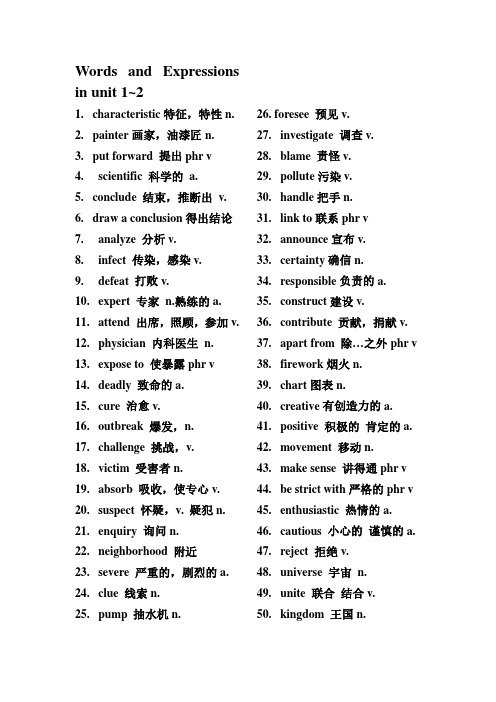
Words and Expressions in unit 1~21.characteristic特征,特性n.2.painter画家,油漆匠n.3.put forward 提出phr v4.scientific 科学的a.5.conclude 结束,推断出v.6.draw a conclusion得出结论7.analyze 分析v.8.infect 传染,感染v.9.defeat 打败v.10.expert 专家n.熟练的a.11.attend 出席,照顾,参加v.12.physician 内科医生n.13.expose to 使暴露phr v14.deadly 致命的a.15.cure 治愈v.16.outbreak 爆发,n.17.challenge 挑战,v.18.victim 受害者n.19.absorb 吸收,使专心v.20.suspect 怀疑,v. 疑犯n.21.enquiry 询问n.22.neighborhood 附近23.severe 严重的,剧烈的a.24.clue 线索n.25.pump 抽水机n. 26.foresee 预见v.27.investigate 调查v.28.blame 责怪v.29.pollute污染v.30.handle把手n.31.link to联系phr v32.announce宣布v.33.certainty确信n.34.responsible负责的a.35.construct建设v.36.contribute 贡献,捐献v.37.apart from 除…之外phr v38.firework烟火n.39.chart图表n.40.creative有创造力的a.41.positive 积极的肯定的a.42.movement 移动n.43.make sense 讲得通phr v44.be strict with严格的phr v45.enthusiastic 热情的a.46.cautious 小心的谨慎的a.47.reject 拒绝v.48.universe 宇宙n.49.unite 联合结合v.50.kingdom 王国n.51.consist of 组成phr v52.province 省n.53.divide into 把…分成phr v54.accomplish 完成v.55.conflict 矛盾冲突n.56.unwilling 不乐意的a.57.break away脱离phr v58.credit 信用,学分,n.59.currency 货币n.60.institution 制度,机制n.61.convenience 便利,方便n.62.rough 粗糙的,粗暴的a.63.attract 吸引v.64.architecture 建筑学n.65.collection 收藏品,珍藏n.66.port 港口n.67.pot 罐,壶n.68.enjoyable 令人愉快的a.69.leave out省去phr v70.opportunity机会n.71.description描写n.72.furnished带家具的a.73.fax传真n.74.possibility可能(性)75.plus加上,和v. 76.quarrel争吵v.77.alike 相同的a.78.take the place of 代替phr v79.break down损坏,phr v80.arrange 安排,筹备v.81.wedding婚礼n.82.fold折叠v.83.sightseeing观光n.84.delight 快乐,高兴n.85.royal 王室的a.86.uniform制服n.87.splendid壮丽的,极好的a.88.statue雕像n.89.thrill 使激动v.90.error错误过失n.91.tense时态n.92.consistent 一致的a.93.original 最初的,原始的a.94.imaginary想象中的a.munism 共产主义n.96.describe描述v.97.break up 断开,分手phr vplete 完成v.cational 教育的a. 100.convenient 方便的a.。
人教版高一英语必修一Unit1wordsandexpressions
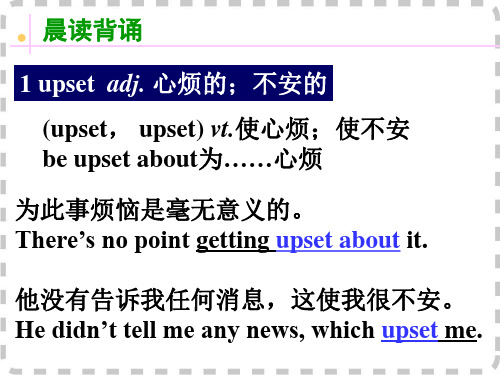
2 ignore vt. 不理睬;忽视
(pretend not to see; pay no attention to)
我向她打招呼, 可她根本不理我! I said hello to her, but she ignored me completely!
3 recover v. recover from从……中恢复过来
(类似: at daybreak 在黎明; at noon 在中午; at night 在晚上)
开车走了很长时间,我们在黄昏时终于到 达城里。 After a long drive we finally arrived at the town at dusk.
23 face to face adv. 面对面地 face-to-face adj. 面对面的
在那个十字路口曾经发生过一连串的事故。 There has been a series of accidents at the crossing.
20 in order to 为了…… (可置于句首或句中,但so as to不能位于句首) 我们得早点儿动身以避开交通高峰期。 In order to get out of the peak-hour traffic, we must start early.
24 no longer /not... any longer 不再……
(=not...any more)
为了搞好学习,我不再打电脑游戏了。 In order to do well in my study, I no longer play computer games. (=…I don’t play computer games any longer)
在我们看来,此事已解决。 As far as we’re concerned, the matter is settled.
New words and expressions for Unit 1
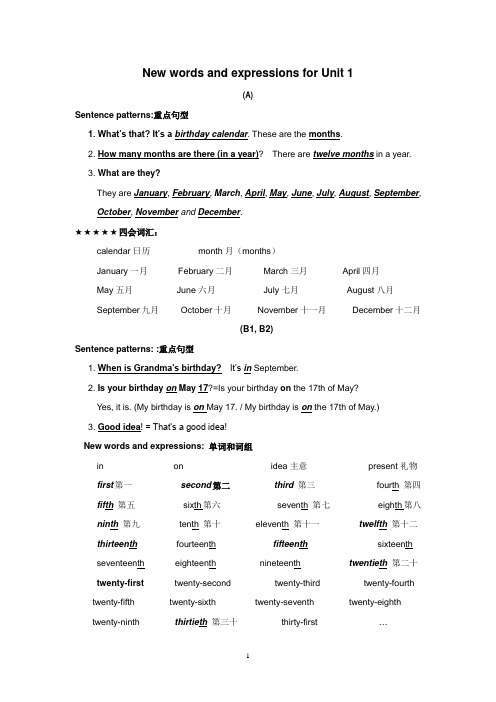
New words and expressions for Unit 1(A)Sentence patterns:重点句型1. What’s that? It’s a birthday calendar. These are the months.2. How many months are there (in a y ear)? There are twelve months in a year.3. What are they?They are January, February, March, April, May, June, July, August, September, October, November and December.★★★★★四会词汇:calendar日历month月(months)January一月February二月March三月April四月May五月June六月July七月August八月September九月October十月November十一月December十二月(B1, B2)Sentence patterns: :重点句型1. When is Grandma’s birthday?It’s in September.2. Is your birthday on May17?=Is your birthday on the 17th of May?Yes, it is. (My birthday is on May 17. / My birthday is on the 17th of May.)3. Good idea! = That’s a good idea!New words and expressions: 单词和词组in on idea主意present礼物first第一second第二third 第三fourth 第四fifth第五sixth第六seventh 第七eighth第八ninth第九tenth 第十eleventh 第十一twelfth 第十二thirteenth fourteenth fifteenth sixteenth seventeenth eighteenth nineteenth twentieth第二十twenty-first twenty-second twenty-third twenty-fourth twenty-fifth twenty-sixth twenty-seventh twenty-eighthtwenty-ninth thirtieth第三十thirty-first …(C, D, E, F, G)Sentence Patterns: :重点句型1. What’s the date today?It’s November 14.2. How old are you? I’m 10 years old.★★★★★四会词汇date日期great-grandpa曾祖父surprise吃惊,惊讶pour the drinks倒饮料cut the cake切蛋糕make a wish许愿Unit 2 Our holidays(A)Sentence patterns: :重点句型复习现在进行时态的用法(第三人称单数)1. What are you doing ? I’m looking at Pat’s photos.Can I have a look? Sure.2. What is Pat doing here?She’s drawing a picture for National Day.She’s singing a song for Chi ldren’s Day.She’s writing a poem for T eacher’s Day.She’s making a card for Christmas Day.★★★★★:重点句型holiday假日photo(photos)照片have a look 看一看sure当然可以National Day国庆节Children’s Day儿童节Teacher’s Day教师节Christmas Day圣诞节draw a picture 画画sing a song唱歌write a poem写诗make a card做卡片,做贺卡(B1, B2, B3,)Sentence patterns: :重点句型1.When’s Mother’s Day? It’s on the second Sunday of May.It’s on May 11this year.=It’s on the 11th of May this year.What are you going to do on Mother’s Day?I’m going to buy some flowers for my mother.2.When’s Father’s Day? It’s on the third Sunday of June.It’s on June 15 this year.=It’s on the 15th of June this year.What are you going to do on Father’s Day?I’m going to make a card for my father.3. When’s National Day? It’s on October 1st.What are you going to do on National Day?I’m going to draw a picture of Tian’anmen Square.★★★★★四会词汇Mother’s Day母亲节Father’s Day父亲节Spring Festival春节New Year’s Day元旦节Women’s Day“三八”妇女节May Day五一劳动节Dragon Boat Festival端午节Mid-Autumn Day中秋节 a gift shop礼品店soon不久,马上,很快Tian’anmen Square 天安门广场(C, D, E, F, G, H)New words and expressions: 单词和词组1. an e-mail电子邮件2. a special day一个特别的日子3. France法国4. Norway挪威5. the USA美国Sentence structures: 句型1. Jenny is going to buy her mum some flowers and a card on Mother’s Day.2. They are going to see her favourite birds at the park.3. J ane’s dad is going to take them to have lunch at a nice restaurant.4. It’s going to be a lovely day!。
文化交流英语words and expressions unit 1-8

Words and expressions in cross – culture courseUnit 1 Performing Arts1.Beijing Opera performance 京剧表演2.Musical instrument 乐器3.Traditional Chinese musical instruments 民乐乐器4.Facial paintings 脸谱5.4种表演形式:唱、念、做、打4 performing methods: singing, recitation, facial and bodyposturing and acting, martial arts6.4 类演员角色:生、旦、净、丑4 roles: male role (sheng), female role (dan), male roles withfacial paintings(jing), clown (chou)7.stringed instrument 弦乐8.percussion instrument打击乐9.“Song of a Pipa Player”琵琶行10.a great treasure of Chinese culture11.dance of Kerchief 巾舞,Dance of Sleeve 长袖舞12.Dances in the Han Dynasty freed themselves from the restrictionof “rituals”.汉舞摆脱了宗教仪式的束缚。
13.Zhao Feiyan “was light as a swallow and could dance on anotherone’s palm ”.14.stage props 道具15.excavate 出土16.wave and float the kerchiefs and sleeves into various bows andflowers 舞动长巾、袖,以展现各式各样花结17.Kunqu Opera 昆曲18.the sister opera of Beijing Opera京剧的姐妹剧19.Kunqu used to be shown to royal or wealthy families only.20.poetic style 诗情画意的风格21.refined 优雅的22.flute 笛子23.lyricism 抒情24.The posture of each role is in a dancing mode.每一个人物造型都是舞蹈动作。
unit 1 words and expressions
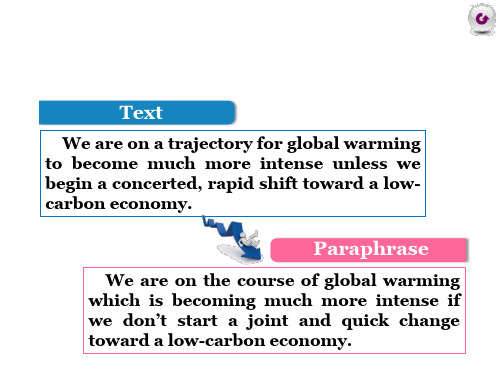
Words and Expressions
9. under the auspices of
with the support and approval of
Example
The community centre was set up under the auspices of a government initiative.
Text
Moreover, we would incur a very large opportunity cost, having lost out on the chance to become the economic leader in developing alternative and more efficient uses of energy.
take something into account
Example
He rewrote the book in light of further research.
Translation
我们将继续从本国国情出 发,坚持改革开放,推动 科学发展,促进社会和谐。
Key
We will, in light of our national conditions, persist in reform and opening-up, promote scientific development and social harmony.
On this issue, the consequences of inaction could be catastrophic.
Translation
患上严重疾病很 可能会是一场经 济灾难。
Key
Contracting a serious illness can be financially catastrophic.
高中英语Unit 1 Words and expressions教案 新课标 人教版 必修1 教案

Unit 1 FriendshipPart Two: Teaching Resources第二部分:教学资源Section 3: Words and expressions from Unit 1 Friendshipadd v.1. put something with something else or with a group of other things: Do you want to add your name to the list? 2. to put two or more numbers together in order to calculate the total: Add 6 and 6 to make 12. 3. to increase the number: The sales tax adds 15% to the price of clothes. 4. to say some more that is related to what has already been said: That’s all I want to say. Is there anythin g you’d like to add.Other verbal phrases of “add”add to: to make something larger and more noticeable: Our explanation seemed only to add to his bewilderment.add up:to calculate the total of several numbers: Add your scores up and we’ll see who won.add up to: to have a particular result: His schooling added up to no more than one year. point: n. 1.small spot: The stars shone like tiny points of light in the sky. 2. sharp end: a knife with a very sharp point. 3. a unit used to show the score in a game or sport: She lost three points for that fall.(in a skating match)upset:1.vt. & vi. to make someone feel unhappy or worried: I’m sorry, I didn’t mean to upset you.2.adj.(not before noun) unhappy and worried: She was still upset about the argument that she had had with Harry.ignore: vt.1.to behave as if you had not seen or heard someone or something(不理睬): Either she didn’t see me wave or she deliberately ignored me. 2.to pay no attention to something that you have been told or that you know about(忽视): Some drivers simply ignore speed limits.calm:1.adj.quiet and without excitement, nervous activity or strong feelings: Keep calm, and try not to panic. 2.vt.& vi.to make someone or something quiet after strong emotion or nervousactivity:Charlie tried to calm the frightened children. 3. calm down:vt &vi.to bee quiet or make someone quiet after strong emotion ornervous activity: Calm down and tell me what happened. concern:1.n.worry: something that worries you or a feeling of worry: There is growing concern about/over the effects of pollution on health. The rise in unemployment is of great concern to the government. 2.vt. to make someone feel worried or upset: The fact that she spends so much money on her own really concerns me. More and more people are concerning themselves with/about environmental problems. 3. be concerned about/for/with: Ross has never been concerned about what other people think of him. Rescuers are concerned for the safety of those trapped in the mine. This story is concerned with a Russian family in the 19th century.cheat: 1.vi.to behave in a dishonest way in order to win or to get a advantage in a petition, game or examination: Jack always cheats at cards. 2. vt.to trick someone who trusts you.share: vi & vt. e equally: The last bus had gone, so the three of us shared a taxi. Ishared a room with him at college. 2. to have the same opinion, experience, feelingetc as someone else: I share your concern about this problem. 3.to tell other peopleabout an idea, secret, problem: It’s alway s better to share your worries. 4. n.part ofsth.: I do my share of the housework. Don’t worry---you’ll get your fair share.set down: to write down something so that you have a record of it: I want to set downmy feelings on paper.Other verbal phrases of “set”set apart:to make someone or somebody different from other people or things.set aside:to keep some money or time for a special purposeset off: to start to go somewhere/ to cause a explosionset out: to start a journey/ to talk about something in an organized wayset up: to start an organization/ to build somethingcrazy adj.1.impractical; foolish: That’s the craziest idea I’ve ever heard.2.mad; ill in the mind: Turn that music down---it’s driving me crazy. 3.be crazy about=to like sb. very much, or be veryinterested in something: The boy is crazy about football. 4.like crazy=very hard: We have to work like crazy to get this finished on time.purpose: 1.n. an intention or plan; the feeling of having an aim in life: The discussion serves a twin purpose---instruction and feedback. Tom went for a walk, with no definite purpose in mind. 2.on purpose=deliberatelytrust:1. n. a strong belief in the honesty, goodness etc. of someone or something e.g. You shouldn’t put your trust in a man like that. 2.vt. to believe that someone is honest and will not harm you or cheat you: I trusted Max, so I lent him the money. Can he be trusted to look after your pet dog? suffer: vt. &vi. 1. to experience physical or mental pain: At least he died suddenly and didn’t suffer a lot. 2. to be in a very bad situation that makes things very difficult for you: If you break the law, you must be prepared to suffer the punishment. She was very generous to him but she suffered for it when he ran away with all her money.3. to experience something unpleasant: The car suffered severe damage in the accident.get along (with):1. to have a friendly relationship: If you two are going to share a room, you’d better learn how to get along. I’ve always found him a bit difficult to get along with.2. to progress you are doing: How are you getting along with your English studies?Other verbal phrases of “get”:get about/around: (news)get widespreadget away: to succeed in leaving a placeget back: to return to a place; to have sth. returned to youget down: to make sb. feel unhappy;get down to sth./doing sth.: to start doing something that needs a lot of time or energy.get over: get well after an illness; to do and finish sth. difficultget through: to pass a test or exammunicate: vi. to express your thoughts and feelings: Parents sometimes find it difficult to municate with teenage child.。
Module1 words and expressions

叹si息gh
句子翻译: 1. 她穿着不正式。 • He wears informal dress. • 2. 正式场合 • formal occassion
• 1. 环境问题会引起严重的疾病。G1,G2 • The environment problem can cause
serious illness. • 2. 你是认真的吗? G3, G4 • Are you serious? • 3. 你应该认真对待这件事情。G5,G6 • You should be serious about this things. • 4. 不要把它当真! G7,G8 • Don't take it seriously ! • 5. 别把我的话当真! G9, G10 • Don't take my words seriously!
lacked the money to buy the ticket. ___ English, he has to study another foreign languag A.Except B. Except for C. In addition to D. Besid
• 12. His frequenta_b_s_e_n_c_e_f_r_o_m__school is worrying.
careful plan_____. A. advanced, before advance B. advancing, in advance C. advanced, in advance D. advancing, in advance of
7. think of 想起, 回忆起 e.g. I think hard but I think of nothing.
Unit 1 Words and Expressions 课件-高中英语译林版(2019)必修第一册

He made great advance in his studies. 他在学业上取得了很大的进步。
The technology is very advanced. 这项技术非常先进。
派生
amazement n. 惊奇;惊诧 amaze v. 使吃惊 amazed adj. 惊奇的,惊讶的
amazing
人……的”。
(2) 以ed结尾的形容词常用来修饰人,表示人的心理状态,意为“感到……的”。有时
也可修饰表情和声音。
confidence n.
派生
信心;信任;自信心
confident adj. 自信的;确信的
confidently adv. 自信地;安心地
搭配
have confidence in 对…… 有信心
She accepted the challenge bravely. 她勇敢地接受了挑战。
派生 positively adv. 肯定地;积极地;明确地 搭配
positive adj. 积极的;
肯定的;确实的;阳性的
have a positive attitude to(towards)… 对…持有乐观的态度
advance booking 预订
例句
We should make preparations in advance. 我们应该提前做好准备。
They received an advance payment for the work. 他们收到了这项工作的预付款。
Please give me an advance notice if you can't come. 如果你不能来,请提前通知我。
学而不思则罔,思而不学则殆。
综合教程第3版Unit 1 Words and expressions for Text I
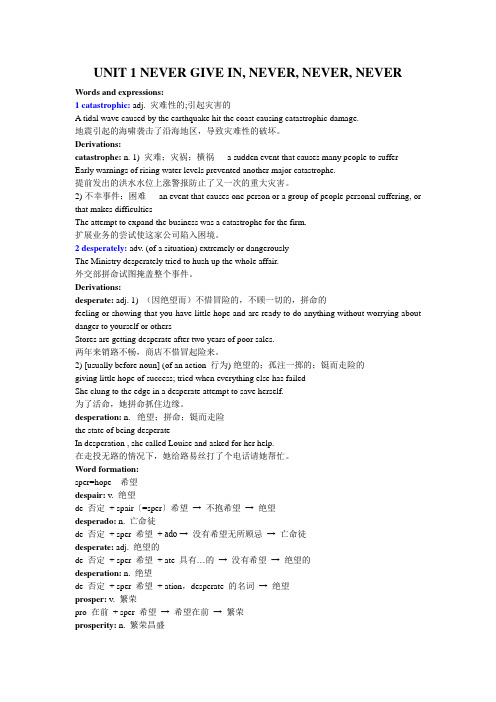
UNIT 1 NEVER GIVE IN, NEVER, NEVER, NEVERWords and expressions:1 catastrophic: adj. 灾难性的;引起灾害的A tidal wave caused by the earthquake hit the coast causing catastrophic damage.地震引起的海啸袭击了沿海地区,导致灾难性的破坏。
Derivations:catastrophe: n. 1) 灾难;灾祸;横祸 a sudden event that causes many people to suffer Early warnings of rising water levels prevented another major catastrophe.提前发出的洪水水位上涨警报防止了又一次的重大灾害。
2)不幸事件;困难an event that causes one person or a group of people personal suffering, or that makes difficultiesThe attempt to expand the business was a catastrophe for the firm.扩展业务的尝试使这家公司陷入困境。
2 desperately: adv. (of a situation) extremely or dangerouslyThe Ministry desperately tried to hush up the whole affair.外交部拼命试图掩盖整个事件。
Derivations:desperate: adj. 1) (因绝望而)不惜冒险的,不顾一切的,拼命的feeling or showing that you have little hope and are ready to do anything without worrying about danger to yourself or othersStores are getting desperate after two years of poor sales.两年来销路不畅,商店不惜冒起险来。
Words and Expressions for Unit 1 Lesson B
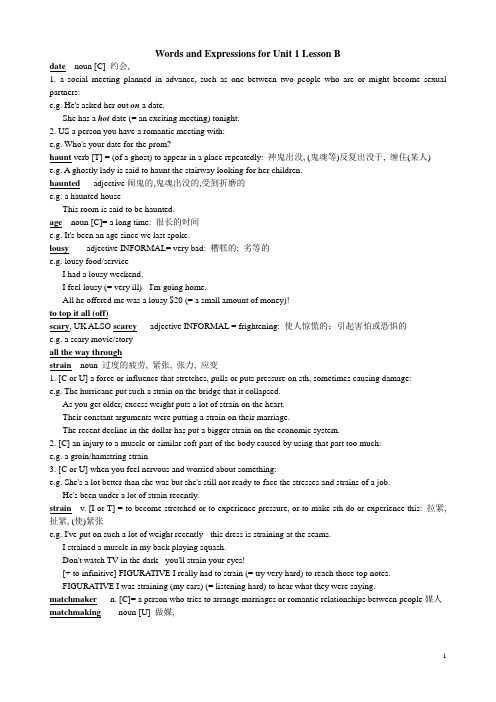
Words and Expressions for Unit 1 Lesson Bdate noun [C] 约会,1. a social meeting planned in advance, such as one between two people who are or might become sexual partners:e.g. He's asked her out on a date.She has a hot date (= an exciting meeting) tonight.2. US a person you have a romantic meeting with:e.g. Who's your date for the prom?haunt verb [T] = (of a ghost) to appear in a place repeatedly: 神鬼出没, (鬼魂等)反复出没于, 缠住(某人) e.g. A ghostly lady is said to haunt the stairway looking for her children.haunted adjective闹鬼的,鬼魂出没的,受到折磨的e.g. a haunted houseThis room is said to be haunted.age noun [C]= a long time: 很长的时间e.g. It's been an age since we last spoke.lousy adjective INFORMAL= very bad: 糟糕的; 劣等的e.g. lousy food/serviceI had a lousy weekend.I feel lousy (= very ill) - I'm going home.All he offered me was a lousy $20 (= a small amount of money)!to top it all (off)scary, UK ALSO scarey adjective INFORMAL = frightening: 使人惊慌的:引起害怕或恐惧的e.g. a scary movie/storyall the way throughstrain noun 过度的疲劳, 紧张, 张力, 应变1. [C or U] a force or influence that stretches, pulls or puts pressure on sth, sometimes causing damage:e.g. The hurricane put such a strain on the bridge that it collapsed.As you get older, excess weight puts a lot of strain on the heart.Their constant arguments were putting a strain on their marriage.The recent decline in the dollar has put a bigger strain on the economic system.2. [C] an injury to a muscle or similar soft part of the body caused by using that part too much:e.g. a groin/hamstring strain3. [C or U] when you feel nervous and worried about something:e.g. She's a lot better than she was but she's still not ready to face the stresses and strains of a job.He's been under a lot of strain recently.strain v. [I or T] = to become stretched or to experience pressure, or to make sth do or experience this: 拉紧, 扯紧, (使)紧张e.g. I've put on such a lot of weight recently - this dress is straining at the seams.I strained a muscle in my back playing squash.Don't watch TV in the dark - you'll strain your eyes![+ to infinitive] FIGURATIVE I really had to strain (= try very hard) to reach those top notes.FIGURATIVE I was straining (my ears) (= listening hard) to hear what they were saying.matchmaker n. [C]= a person who tries to arrange marriages or romantic relationships between people媒人matchmaking noun [U] 做媒,spice sth up phrasal verb [M]= to add excitement or interest to a speech, story or performance: 添加刺激e.g. He'd spiced up his speech with a few rude jokes.It was one of those articles on how to spice up your life.enrol UK (-ll-), US enroll verb [I or T] = to put yourself or someone else onto the official list of members of a course, college or group: 登记, 注册e.g. Is it too late to enrol at the college?I enrolled for/in/on the modern art course.He is enrolled as a part-time student.They want to enrol their children in their local school.enrollment n.bear v. [T] bore, borne or US ALSO born= to accept, tolerate or endure esp. sth. unpleasant: 忍受e.g. The strain must have been enormous but she bore it well.Tell me now! I can't bear the suspense!It's your decision - you must bear the responsibility if things go wrong.[+ to infinitive] He couldn't bear to see the dog in pain.[+ ing form of verb] I can't bear be ing bored.stand verb [T usu. in negatives] stood, stood= to successfully accept or bear something which is unpleasant or difficult: 忍受e.g. I can't stand her voice.Our tent won't stand another storm like the last one.[+ ing form of verb] I can't stand hear ing her cry.the last minute noun [S]= the latest possible opportunity for doing something: 最后一刻,紧急关头e.g. They only told me at the last minute that they couldn't come.Why do you always leave everything till the last minute?exotic adjective= unusual and often exciting because of coming (or seeming to come) from a distant, especially tropical country: 异国情调的, 外来的, 奇异的e.g. exotic flowers/food/designcruise n. [C]= a journey on a large ship for pleasure, during which you visit several places巡游,航行,航游cruise v.exclusive adjective排外的, 孤高的, 唯我独尊的, 独占的, 唯一的, 高级的1. limited to only one person or group of people:e.g. This room is for the exclusive use of guests.an exclusive interview2. expensive and only for people who are rich or of a high social class:e.g. an exclusive private cluban apartment in an exclusive part of town.exclusive of sth = not including something: 除...外, 不计算在内e.g. Is the total exclusive of service charges?mutually exclusive = not possible at the same time: 互斥的e.g. Some people think that uncontrolled economic growth and environmental stability are mutually exclusive. spouse noun [C] FORMAL OR LEGAL= a person's husband or wife: 配偶(指夫或妻)e.g. In 60% of the households surveyed both spouses went out to work.absurd adjective= ridiculous or unreasonable; foolish in an amusing way: 荒谬的, 可笑的e.g. Don't be so absurd! Of course I want you to come.It's an absurd situation - neither of them will talk to the other.awkward adjective难使用的, 笨拙的1. causing inconvenience, anxiety or embarrassment:e.g. an awkward position/situationThere followed an awkward silence while we all tried to think of something to say.They'd chosen an awkward time to call as I'd just got into the bath.The police asked some awkward questions about where the money had come from.2. embarrassed or nervous: 困窘的e.g. I always feel awkward when I'm with Chris - he's so difficult to talk to.He seemed a little awkward when I first met him.awkward adjective= difficult to use, do, or deal with: 不好使用的; 使人感到麻烦的; 难应付的, 棘手的e.g. It's an awkward corner to drive round, so take it slowly.Some of the questions were rather awkward.It was an awkward ascent, but we reached the top eventually.[+ to infinitive] My car's quite awkward to drive.He's an awkward customer (= a difficult person to deal with).disastrous adjective = extremely bad or unsuccessful: 灾难性的, 悲惨的; 招致不幸的; 造成重大伤亡的e.g. Such a war would be disastrous for the country.This decision will have a disastrous impact on foreign policy.His first attempt was disastrous.hilarious adjective= extremely amusing and causing a lot of laughter: 欢闹的:引起或喜好欢闹的e.g. He didn't like the film at all - I thought it was hilarious.horrendous adjective= extremely unpleasant or bad: 可怕的, 惊人的e.g. a horrendous accident/tragedy/crimehorrendous suffering/damageConditions in the refugee camps were horrendous.The firm made horrendous (= very big) losses last year.horrifying adjective= very shocking: 恐怖的,震惊的e.g. horrifying injuries/conditions/newsintrigue v. [T] = to interest sb. a lot, esp. by being strange, unusual or mysterious: 激起...的兴趣, 用诡计取得e.g. Throughout history, people have been intrigued by the question of whether there is intelligent life elsewhere in the universe.intriguing adjective阴谋的, 引起兴趣的, 有魅力的e.g. an intriguing possibility/questionShe has a really intriguing personalitytense adjective紧张的, 拉紧的1. nervous and anxious and unable to relax:e.g. She was very tense as she waited for the interview.2. If a situation is tense, it causes feelings of anxiety:e.g. There were some tense moments in the second half of the game.thrilling adjective= extremely exciting: 毛骨悚然的; 惊心动魄的, 使人感动的; 使人激动的; 使人发抖的e.g. The book is a thrilling adventure storyinadvisable adjective = unwise and likely to have unwanted results and therefore worth avoiding: 不可取的, 不妥当的; 不明智的; 失策的e.g. Skiing is inadvisable if you have a weak heart.It is inadvisable to generalize from the results of a single experiment.play it cool = to behave in a calm, controlled way, often intentionally appearing not to be interested in the thing that you particularly want to get: 抑制住感情, 冷漠e.g. Play it cool - don't let them know how much you need the money.blind date noun [C] 从未晤面的男女经第三者安排所作的约会1. when two people who have never met each other go out for a romantic social meeting:e.g. Elaine arranged for me to go on a blind date with a bloke from her office.2.either of the people who meet for a blind dateindiscreet adjective= saying or doing things which let people know things that should be secret or which embarrass people: 欠慎重的, 轻率的; 未经思考的; 不稳重的e.g. In an indiscreet moment, the president let his genuine opinions be known.They have been rather indiscreet about their affair.alive adjective活着的, 活泼的1. [after verb] living; having life; not dead:e.g. He must be ninety if he's still alive.Doctors kept him alive on a life-support machine.She's alive and well and living in New Zealand.2. If something is alive, it continues to exist:e.g. Relatives of the missing sailors are struggling to keep their hopes alive.maintain v. [T] = to continue to have; to keep in existence, or not allow to become less: 维持或保持;继续:e.g. The army has been brought in to maintain order in the region.We have standards to maintain.Despite living in different countries, the two families have maintained close links.The film has maintained its position as the critics' favorite for another year.spontaneous adj.= happening or done in a natural, often sudden way, without any planning or without being forced: 自发的, 自然产生的, 本能的, 自动的e.g. His jokes seemed spontaneous, but were in fact carefully prepared beforehand.APPROVING She's such a spontaneous, lively woman.spontaneously adverbe.g. The liquid spontaneously ignited.spontaneity noun [U] APPROVINGe.g. The script has a refreshing spontaneity and sparkle.romance noun 浪漫的感情, 冒险故事, 浪漫史, 传奇文学, 风流韵事, 虚构1. [C] a close, usually short relationship of love between two people:e.g. They got married last year after a whirlwind (= very short and unexpected) romance.It was just a holiday romance.Office romances are usually a bad idea.2. [U] when you feel love and sexual attraction for someone:e.g. I felt as though all the romance had gone out of my marriage.3. [U] the feeling of excitement or mystery that you have from a particular experience or event:e.g. He loves the romance of traveling on a steam train.4. [C] a story about love:e.g. a historical romanceShe loves reading romancestake sth for granted= to believe something to be the truth without even thinking about it:e.g. I didn't realize that Melanie hadn't been to college - I suppose I just took it for granted.take sth or sb for granted = If you take situations or people for granted, you do not appreciate or show that you are grateful for how much you benefit from them:e.g. One of the problems with relationships is that after a while you just take each other for granted. compliment noun称赞, 恭维, 致意, 问候, 道贺1 [C] a remark that expresses approval, admiration or respect:e.g. She complained that her husband never paid her any compliments any more.I take it as a compliment (= I am pleased) when people say I look like my mother.Are you fishing for (= trying to get) compliments?2. [S] an action which expresses approval or respect:e.g. You should take it as a compliment when I fall asleep in your company - it means I'm relaxed.Thank you so much for your help - I hope one day I'll be able to return/repay the compliment (= do something good for you).compliment verb [T] = to praise or express admiration for someone: 称赞, 恭维, 致意e.g. I was just complimenting Robert on his wonderful food.I must compliment you on your handling of a very difficult situation.in private= If you talk to someone or do something in private, you do it without other people being present: 私下, 秘密地e.g. Jamie wants to speak to me in private.in public = in a place where people can see you: 当众, 公开地, 公然地e.g. I'd never behave like that in public.slob noun [C] = a lazy, untidy and often rude person: 懒汉, 粗俗汉, 笨蛋e.g. He's a big fat slob of a man - I can't stand him.obstacle noun [C]= something that blocks you so that movement, going forward or action are prevented or made more difficult: 障碍, 妨害物e.g. The biggest obstacle in our way was a tree trunk in the road.This decision has removed the last obstacle to the hostages' release.common ground noun [U]= shared interests, beliefs or opinions between two people or groups of people who disagree about most other subjects: 共同点e.g. It seems increasingly unlikely that the two sides will find any common ground.attract sb. to sth.in the first place = in or at the beginning (of a series of events): 首先e.g. The trousers shrank when I washed them, but they weren't really big enough in the first place.Thankfully, he wasn't hurt, but he never should have been there in the first place.commit verb [I or T] -tt- = to promise or give your loyalty, time or money to a particular principle, person or plan of action: 称诺, 答应负责e.g. [R] Like so many men, he has problems committing himself to a relationship.The government must commit itself to improv ing health care.Once we have committed to this course of action there is no going back.shape noun [U] 外形, 形状, 形态, (尤指女子的)体形, 身段1. condition, or state of health:e.g. He bought up businesses that were in bad/poor shape, and then sold them off bit by bit."How are you?" "Oh, I'm in great shape."You're in no shape (= not in a good enough state of health) to go to work today.2. good structural or physical condition:e.g. It's taken us five years to get our house into shape.She runs six miles every day to help keep herself in shape.I haven't had any exercise for weeks, and I'm really out of shape (= not in good physical condition). attentive adjective = If sb. is attentive, they are very helpful and take care of you: 注意的, 专心的, 留意的e.g. He was very attentive to her when she was ill.A good teacher is always attentive to their students' needs.attentive adjective = listening carefully: 专心的e.g. an attentive audienceups and downs plural noun= If someone or something experiences ups and downs, a mixture of good and bad things happens to them: 盛衰, 沉浮e.g. Like most married couples we've had our ups and downs, but life's like thattalk throughsquabble noun [C]= an argument over an unimportant matter: 争论, 争吵e.g. Polly and Susie were having a squabble about who was going to hold the dog's lead.not be the end of the world INFORMAL= If something is not the end of the world, it will not cause very serious problems:e.g. I'm really hoping to win, but it won't be the end of the world if I don't.mutual adjective= (of two or more people or groups) feeling the same emotion, or doing the same thing to or for each other: 相互的, 共有的e.g. Theirs was a partnership based on mutual respect, trust and understanding.Both countries are acting to their mutual advantage.The agreement was terminated by mutual consent.mutually adverbe.g. It will be a mutually beneficial project.Being rich and being a Socialist are not mutually exclusive (= they can exist together at the same time). point n. = [S] an opinion or fact that deserves to be considered seriously, or which other people agree is true: 要点, 观点e.g. Yes, I can see your point/you've got a point there.OK, you've made your point (= told us your opinion) - there's no need to go on about it.score (points) off/over sb (ALSO score points)= to make clever remarks in order to make someone look foolish:使某人出丑e.g. He's always trying to score points over people and it's really irritating.。
Unit 1 Words and expressions-高中英语人教版(2019)必修第三册

Unit focus V-ing form
Unit focus
1 ● V-ing form used as attributive.
[Discussion 1] ★ We are not allowed to speak aloud in the reading room. ★ There is a swimming pool in our school.
[Conclusion 1] When used as attributive, V-ing is aimed to decorate the noun's _p_r_o_p_e_r_/_f_u_n_c_t_io_n__/_a_p_p_l_ic_a_t_io_n__.
Unit focus
1 ● V-ing form used as attributive.
Unit focus
2 ● V-ing form used as predictive.
[Discussion 2] ★ The problem is quite puzzling. ★ The film we saw last night was very moving.
[Conclusion 2] When V-ing is used to express the character of the subject, it can be usually seen as ___a_d_j_e_ct_i_v_e__. Link: astonishing, amusing, confusing, disappointing, boring, encouraging, inspiring, moving, tiring, interesting, surprising ...
Words and Expressions (Unit1 Book2)
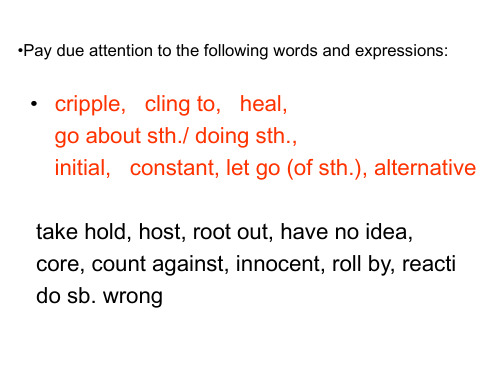
harmony
① a state of peaceful existence and agreement 融洽;和睦
• in harmony with • ---They have been living in harmony with each other for many years. • 多年来,他们一直相处得很融洽。 多年来,他们一直相处得很融洽。 融洽 • ---我们必须确保工业与环境和谐发展。 我们必须确保工业与环境和谐发展。 和谐发展 • We must ensure that industry develops in harmony with the environment.
这个公园下周末将举办艺术节。
• ---这家工厂每年接待10万名来访者。 •
The factory is now hosting 100,000 visitors a year. • The factory is now playing host to 100,000 visitors a year.
•
2. n. 首字母 (pl.)
• ---Just write your initials. • • • • initiate initiation initiative initiator v. 开始 n. 开始,创始,发起 n. 主动性,积极性;主动权 n. 创始人
What is the initial act of forgiveness? ---A hug with the one who has hurt you and whom you used to hate very much; or an IForgive-You ; or a friendly smile; or any other make-up signal.
Words and Expressions for Unit 1 Lesson A

Words and Expressions for Unit 1 Lesson Alook up to sb phrasal verb = to admire and respect someone: 尊敬e.g. He'd always looked up to his uncle.be critical ofprosperity n. [U]= the state of being successful and having a lot of money: 繁荣, 旺盛;成功, 顺利, 幸福e.g. A country's future prosperity depends, to an extent, upon the quality of education of its people.The war was followed by a long period of peace and prosperity.prosperous adj. = successful, usually by earning a lot of money: 繁荣的e.g. In a prosperous country like this, no one should go hungry.adversity noun [C or U]= a difficult or unlucky situation or event: 不幸, 灾祸, 逆境e.g. She was always cheerful in adversity.The road to happiness is paved with adversities.adverse adjective [before noun]= having a negative or harmful effect on sth: 不利的, 敌对的, 相反的e.g. The match has been cancelled due to adverse weather conditions.They received a lot of adverse publicity/criticism about the changes.So far the drug is thought not to have any adverse effects.cheer (sb) up phrasal verb [M]= If someone cheers up, or something cheers them up, they start to feel happier: e.g. She was ill so I sent her some flowers to cheer her up.He cheered up at the prospect of a meal.[R] She went shopping to cheer herself up.drift apart phrasal verb= If two people drift apart, they gradually become less friendly and their relationship ends 疏远essential adjective = necessary; needed: 本质的, 实质的, 基本的e.g. Government support will be essential if the project is to succeed.There is essential work to be done before the building can be re-occupied.Water is essential for/to living things.It is essential (that) our prices remain competitive.For the experiment to be valid, it is essential to record the data accurately.essential noun [C usually plural]= a basic thing that you cannot live without: 本质, 实质, 要素, 要点e.g. Because I live in a remote village, I regard my car as an essential.When we go on holiday, we only take the bare essentials.This leaflet will give you the essentials of how to use the word processor.as far as sb is concerned= in a particular person's opinion:e.g. As far as I'm concerned, feng shui is a load of rubbish.best-selling adjective [before noun] 最畅销的, 最红的e.g. She's a best-selling author (= an author whose books are very popular).demonstrate (SHOW) verb [T] 示范, 证明, 论证, 表示, 表明1. to show; to make clear:e.g. These figures clearly demonstrate the size of the economic problem facing the country.[+ that] Research has demonstrated that babies can recognize their mother's voice very soon after birth.These problems demonstrate the importance of strategic planning.2. to show something and explain how it works:e.g. He's got a job demonstrating kitchen equipment in a department store.[+ question word] The teacher demonstrated how to use the equipment.in detail= including or considering all the information about something or every part of sth: 详细地e.g. We haven't discussed the matter in detail yet.The book described her sufferings in graphic detail.He talked in great detail about the curtains he's chosen for his lounge.straightforward adjective= easy to understand or simple: 简单的, 易懂的, 直接了当的e.g. Just follow the signs to Bradford - it's very straightforward.straightforward adjective= (of a person) honest and not tending to hide their opinions: 正直的, 坦率的e.g. Roz is straightforward and let's you know what she's thinking.run into sb phrasal verb = to meet someone you know when you are not expecting to: 撞上, 偶遇,e.g. Graham ran into someone he used to know at school the other day.stand by sb phrasal verb= to continue to support or help someone who is in a difficult situation: 支持e.g. She has vowed to stand by her husband during his trial.stick up for sth/sb phrasal verb INFORMAL= to support or defend someone or something, especially when they are being criticized: 为...辩护, 维护e.g. I can stick up for myself.It's sweet the way he sticks up for his little brother.put up with sth/sb phrasal verb= to accept or continue to accept an unpleasant situation or experience, or someone who behaves unpleasantly: 忍受, 容忍e.g. I can put up with the house being untidy, but I hate it if it's not clean.He's so moody - I don't know why she puts up with him.They have a lot to put up with (= They have a lot of difficulties).make up phrasal verb = to forgive sb. and be friendly with them again after an argument or disagreement: 和解e.g. They kissed and made up, as usual.We often quarrel but we always make it up soon after.resume verb FORMAL 再继续, 重新开始, 重新占用, 再用, 恢复1. [I or T] If an activity resumes, or if you resume it, it starts again after a pause:e.g. Normal services will be resumed in the spring.[+ ing form of verb] He stopped to take a sip of water and then resumed speak ing.The talks are due to resume today.2. [T] If you resume a place or position which you have left for a period of time, you return to it:e.g. to resume your post/jobPlease resume your seats, as the performance will continue in two minutes.lose touch to stop communicating with someone, usually because they do not live near you now:e.g. We lost touch (with each other) over the years.have sth in common = to share interests, experiences or other characteristics with someone or something:e.g. We don't really have much in common.in common with sb/sth = in the same way as someone or something:e.g. In common with many mothers, she feels torn between her family and her work.social/ educational backgroundsimilar values / personalitiespotential adjective [before noun]= possible when the necessary conditions exist: 潜在的, 可能的e.g. A number of potential buyers have expressed interest in the company.Many potential customers are waiting for a fall in prices before buying.The accident is a grim reminder of the potential dangers involved in North Sea oil production.potential noun [U]= someone's or something's ability to develop, achieve or succeed: 潜能, 潜力e.g. The region has enormous potential for economic development.I don't feel I'm achieving my full potential in my present job.[+ to infinitive] Y ou have the potential to reach the top of your profession.I think this room has got a lot of potential (= could be very good if some changes were made to it). correspond verb [I] = to communicate by writing a letter or sending an email: 通信,e.g. I've been corresponding with several experts in the field.correspond verb [I] = to match or be similar or equal: 相似,相当, 一致:一致e.g. The money I've saved corresponds roughly to the amount I need for my course.The American FBI corresponds to the British MI5.His story of what happened that night didn't correspond with the witness's version.thesis noun [C] plural theses论题, 论文1. a long piece of writing on a particular subject, esp. one that is done for a higher college or university degree:e.g. a doctoral thesis (= for a PhD)2. FORMAL the main idea, opinion or theory of a person, group, piece of writing or speech:e.g. Their main thesis was that war was inevitable.have urge to do sthcount on sb phrasal verb= to be confident that you can depend on someone: 依靠, 指望e.g. Y ou can always count on Michael in a crisis.[+ to infinitive] I can count on my parents to help me.significant adjective = important or noticeable: 重要的, 重大的, 值得注意的e.g. There has been a significant increase in the number of women students in recent years.The talks between the USA and the USSR were very significant for the relationship between the two countries. significance noun [U] = importance:The discovery of the new drug is of great significance for/to people suffering from heart problems.significant adjective= having a special meaning: 有意义的e.g. She looked at him across the table and gave him a significant smile.Do you think it's significant that he hasn't replied to my letter yet?significance noun [U]= special meaning:e.g. Do you think that look he gave you had any significance?sales rep noun [C] (FORMAL sales representative) 商品经销代理, 营业代表= someone who travels to different places trying to persuade people to buy their company's products or services pharmaceutical adjective= connected with the production of medicines: 制药(学)上的e.g. the pharmaceutical industrya pharmaceutical company/product/journalpharmaceutical noun [C usually plural]= a medicineimpulse noun [C + to infinitive]= a sudden strong desire to do something: 刺激; 鼓舞e.g. I had this sudden impulse to shout out "Rubbish!" in the middle of her speech.on (an) impulse= because you suddenly want to, although you haven't planned to:"I didn't know you were looking for some new shoes." "Oh, I wasn't - I just bought them on impulse”impulsive adj. = showing behavior in which you do things suddenly without any planning and without considering the effects they may have: 有推动力的; 冲动的e.g. Don't be so impulsive - think before you act.an impulsive man/decision/gesturemargin noun [C] 页边的空白, (湖、池等的)边缘, 极限, 利润, 差数, (时间、金额等的)富余1. the outer edge of an area:e.g. The plant tends to grow in the lighter margins of woodland areas.2. the empty space to the side of the text on a page, sometimes separated from the rest of the page by a vertical line:e.g. If I have any comments to make, I'll write them in the margin.。
英语 Module 1 New words and expressions
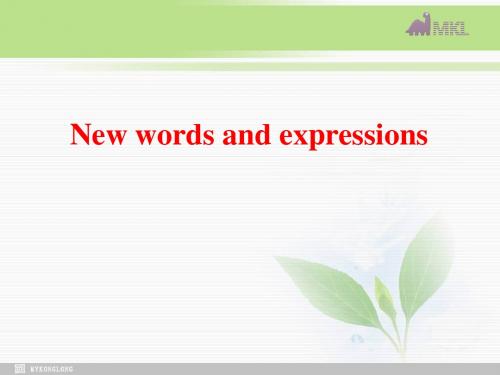
v. 开火,启动
The officer ordered his men to fire at/ on the enemy. He was fired for stealing money from the till.
6. limit n./v. 限度,限制 limited; limitless
He tried my patience to its limit.
3. risky risk n./v. a risky undertaking 一份风险大的事业 There is no/not much risk of her failing. We mustn’t risk getting caught in a storm. risk doing sth. 冒……危险;明知……也要做
7. command n./v. 1). Give your commands in a loud, confident voice. 下命令 Our troop was under his command. 由…指挥 do sth at/ by sb’s command 奉某人命做某事
2). He has a good command of the English language. 精通 3).The officer commanded his men to fire. The teacher commanded that he (should) go out of the classroom.
2. prediction n. [C][U]预言;预报, 预告 make a prediction/make predictions 作预测 v. predict 预言某事将发生,预报 adj. predictable 可预言的,可预报的
- 1、下载文档前请自行甄别文档内容的完整性,平台不提供额外的编辑、内容补充、找答案等附加服务。
- 2、"仅部分预览"的文档,不可在线预览部分如存在完整性等问题,可反馈申请退款(可完整预览的文档不适用该条件!)。
- 3、如文档侵犯您的权益,请联系客服反馈,我们会尽快为您处理(人工客服工作时间:9:00-18:30)。
1.force sb to do sth 迫使某人做某事
2.play a … role/part in …在……中发挥作用
3.feel sorry about 对……感到不幸/惭愧
4.feel sorry for sb 为某人感到难过
5.give sb a lift 让某人搭便/顺车
6.drown out vt.(声音)盖过;压过
7.bring …back to life 使……恢复生气
e back to life (经济/某人)复活/苏醒
9.extraordinary tales 非比寻常的故事
10.adapted from 改编自……
11.be adapted to sth 适应
12.at birth 出生时
13.wear a mask 戴面具
14.wander the Earth 四处流浪
15.fall in love with 爱上
16.cast/put sb into prison 把某人投入/关进监狱
17.be taken to prison 被投入监狱
18.suffer from 遭受……痛苦/折磨19.cry with joy 因高兴而哭泣
20.take sb to safety 带某人到安全地带
21.burst in vi.闯入
burst into tears =
burst out crying
突然大哭起来
burst into
laughter=burst
out laughing 突然
大笑。
